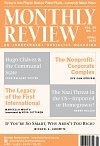Volume 66, Issue 11 (April)

The Review of the Month in this issue (“Chávez and the Communal State” by John Bellamy Foster) focuses on the revolutionary political strategy introduced by Hugo Chávez and the Bolivarian movement in Venezuela. In the process it addresses how István Mészáros’s Beyond Capital played a key, strategic role in the development of Chávez’s thinking. Beyond Capital is a daunting philosophical work of around a thousand pages, while many of his other writings are nearly as challenging. MR readers will therefore be pleased to learn that we have just published a new book by Mészáros, The Necessity of Social Control (Monthly Review Press, 2015), expressly designed, as Foster writes in the book’s “Foreword,” as “an easily accessible work,” providing “a way into his thinking for the uninitiated” (9).… Yet, Mészáros’s new book is much more than that. | more…
On the Transition to Socialism in Venezuela
On October 20, 2012, less than two weeks after being reelected to his fourth term as Venezuelan president and only months before his death, Hugo Chávez delivered his crucial El Golpe de Timón (“Strike at the Helm”) speech to the first meeting of his ministers in the new revolutionary cycle. Chávez surprised even some of his strongest supporters by his insistence on the need for changes at the top in order to promote an immediate leap forward in the creation of what is referred to as “the communal state.” This was to accelerate the shift of power to the population that had begun with the formation of the communal councils (groupings of families involved in self-governance projects—in densely populated urban areas, 200–400 families; in rural areas, 50–100 families). The main aim in the new revolutionary cycle, he insisted, was to speed up the registration of communes, the key structure of the communal state. | more…
“Marx was before all else a revolutionary. His real mission in life,” noted Frederick Engels at Marx’s graveside, “was to contribute in one way or another to the overthrow of capitalist society and of the forms of government which it had brought into being, to contribute to the liberation of the present-day proletariat.” Could the same be said about Marxist economists? That they are revolutionaries whose real mission is to contribute to the overthrow of capitalism? | more…
Interview with Marcello Musto
The International Working Men’s Association (IWMA), nowadays better known as the First International, was founded in London in September 1864. Despite the importance of the event, there has not been much attention to its 150th anniversary. To an extent, this reflects the situation of the present day, with the hegemony of neoliberal politics and, conversely, the weakness of the left, that does not seem to be interested in its own history and the lessons that might be extracted from past experiences.… Luckily, there are exceptions. Marcello Musto, an assistant professor of sociology at York University in Toronto, has contributed to two important presentations of the experience of the First International… The International after 150 Years: Labour Versus Capital, Then and Now …[and] the first English-language anthology on the IWMA, Workers Unite! The International 150 Years Later. | more…
An Integral Component and Driving Force of Imperialism in the Phase of Monopoly-Finance Capitalism
According to Michał Kalecki, the imperialist system of the Keynesian era rested on a triangular structure that was composed of (a) state-financed military production (i.e., the military-corporate complex, often called the “military-industrial complex”), (b) media propaganda (media-corporate complex), and (c) a putative full-employment/welfare-oriented superstructure (Keynesianism) underpinned by the war machine, serving to justify it. Building on Kalecki’s work, John Bellamy Foster, Hannah Holleman, and Robert W. McChesney provided an updated version of the theory of imperialism of the monopoly-capital tradition by laying emphasis on the primary role of the above triangle in the restructuring and preservation of the contemporary imperialist system.. Expanding on their work, I argue that one of the most significant changes in the triangular structure of contemporary imperialism is in its third pillar, particularly with the abandonment of the welfare-oriented paradigm and the adoption of the neoliberal globalization project. | more…
Marge Piercy is the author of eighteen poetry books, most recently The Hunger Moon: New & Selected Poems, 1980–2010 (Knopf, 2011). Her most recent novel is Sex Wars (Harper Perennial, 2005) and she has just published her first collection of short stories, The Cost of Lunch, Etc. (PM Press, 2014). | more…
Eric Lichtblau, The Nazis Next Door: How America Became A Safe Haven for Hitler’s Men (Boston: Houghton-Mifflin, 2014), 256 pages, $28.00, hardcover.
Fascism has come full circle…. The main sponsor of this regime this time is not Nazi Germany but Washington…. U.S. military adventures in the Middle East and Africa [and the] [r]esort to imperialist wars abroad also reflects growing social polarization at home, the hollowing out of U.S. liberal democracy as a result of the power of money, the gigantic expansion of the security and surveillance state, the spread of armed vigilantism, the intensification of racism, and the militarization of the U.S. police.… What we are likely witnessing is a situation in which it is no longer possible for the capitalist class in crisis to rule the people of the United States in the old way. A process is underway that involves the withering away of liberal democracy and the arrival of a not-so-friendly fascist order meant to bolster capitalism through a resort to authoritarian discipline. How far this process goes depends on political events and the effects of the ongoing economic crisis on public consciousness. | more…
